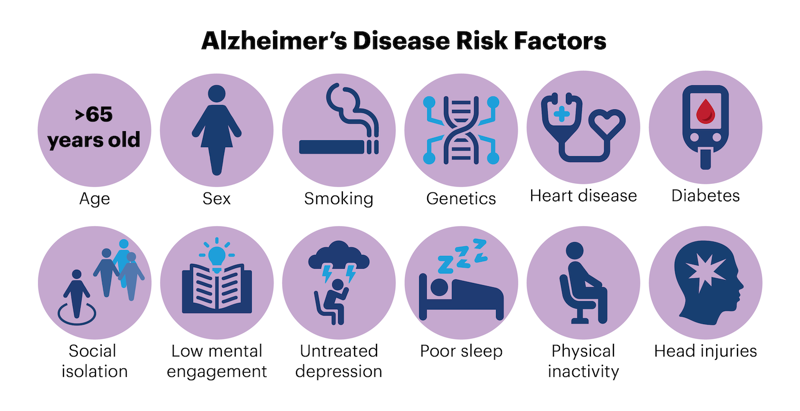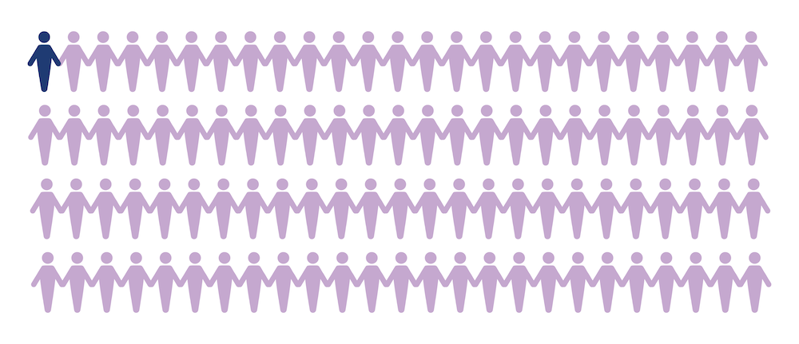
If I have an APOE-ε4 variant, will I develop Alzheimer’s disease?
May 12, 2023

- Related Topics:
- Aging,
- Complex traits,
- Genetic variation
Chen from Ontario asks:
"I have the ε4 variant in the alzheimer gene APOE. Will I get alzheimer when im 80 like in 60 years?"
Not necessarily, no. While people with the ε4 genetic variant are at a significantly higher risk of developing Alzheimer’s disease, it is not a guarantee.
Alzheimer’s disease is the most common form of dementia, affecting 1 in every 9 people above the age of 65.1 In the past few decades, scientists have learned a lot about the causes of this condition. While genetics do play a major role, non-genetic things matter a lot too.
Since Alzheimer’s disease — and other forms of dementia — are not purely genetic, adjusting some lifestyle factors and behaviors can decrease your risk of developing it.2 This includes things like exercise, not smoking, and staying mentally active.
And who knows, over the next 60 years maybe we’ll learn how to prevent this disease altogether! A lot can change in six decades.
But in the meantime, read on to learn more about what we know about Alzheimer’s risk today, how APOE fits into that, and the other non-genetic things that affect your overall risk.

APOE and Alzheimer’s disease
Your genes do play a major role in how likely you are to develop certain kinds of dementia, including Alzheimer’s disease. A person with a family history of Alzheimer’s is more likely to develop the disease than someone whose family tree is free of it. And scientists have also observed that if one identical twin has Alzheimer’s, the other often — but not always — does too.3
Both of those patterns show that Alzheimer’s disease can be at least partially inherited. But if Alzheimer’s disease were fully genetic, identical twins — who have exactly the same DNA — would always match. Since there are plenty of twin pairs where one has the condition while the other does not, we know that genetics aren’t the full answer.
From studying family trees, scientists have estimated that Alzheimer’s is around 70% attributable to genetics.4
The most famous Alzheimer-related gene is APOE. This gene comes in three different versions: ε2, ε3, and ε4. And since almost everyone has two copies of this gene (one from each parent!), people have a variety of combinations of this gene. Which two versions you have influences your risk of developing the disease.
APOE ε4 is the one associated with an increased risk of Alzheimer’s. Along with age, whether you have an ε4 variant is one of the strongest risk factors for developing Alzheimer’s.4 Around ⅔ of patients with Alzheimer’s have at least one copy of this variant.5,6
It isn’t too surprising for someone to find out they have the ε4 variant, since it is very common in people. Around 1 in every 4 people have one copy of the ε4 variant.7,8 They have a 3x higher risk of developing Alzheimer’s.4 While exact estimates vary, a person with one copy of ε4 has a 20-25% chance of developing some form of cognitive impairment or dementia in their lifetime.9
Around 1 in 50 people have two copies of ε4.7,8 They have a 12x higher risk of developing Alzheimer’s.4 People with two copies of ε4 are estimated to have a 35-50% chance of developing some form cognitive impairment or dementia in their lifetime.9
But having a copy of the ε4 variant doesn’t guarantee that you’ll develop Alzheimer’s. Many people with ε4 variants never develop dementia.
|
Number of APOE ε4 copies |
% of people7,8 |
Lifetime risk of dementia or mild cognitive impairment9 |
|
None |
3 in every 4 people (73%) |
10-15% |
|
One |
1 in every 4 people (25%) |
20-25% |
|
Two |
1 in every 50 people (2%) |
35-50% |
Other genetic factors
APOE isn’t the only gene that affects someone’s chance of developing Alzheimer’s. Researchers have identified over 20 different genes linked to this condition, and suspect there are even more that haven’t been found yet.4
Another contributing genetic factor is your sex. ⅔ of Alzheimer’s patients are post-menopausal women, which suggests genes linked to sex or hormones could play a particularly important role.1
All of these genetic differences affect your chances of developing the most common type of Alzheimer’s. In this type of Alzheimer's, dementia occurs sporadically. Someone might be the first person in the family to have the condition. Or maybe a few people have it, but it’s unpredictable. And it usually occurs later in life, after the age of 65.
But in <1% of cases, Alzheimer’s disease is familial.4 In these rare families, a person with Alzheimer’s will always have a parent who also had it. And their parent also had the condition. And so on through the generations.
Symptoms of this type of Alzheimer’s occur earlier in life, between the ages of 30 and 60. For this reason, it’s often described as “early-onset Alzheimer’s disease”. This unique form of Alzheimer’s has its own specific genetic causes.
Familial, early-onset Alzheimer’s is caused by rare differences in three specific genes: amyloid precursor protein (APP), presenilin 1 (PSEN1), and presenilin 2 (PSEN2). Inheriting even one of those rare genetic differences is enough to cause the disease. And a person with that genetic difference has a 50% chance of passing it on to a child.4 That kind of inheritance pattern is called autosomal dominant.
While early-onset Alzheimer’s is rare, speaking with a physician or genetic counselor may help someone determine whether this type of Alzheimer’s runs in their family.

Non genetic factors
A person’s chances of developing late-onset Alzheimer’s disease or other forms of dementia is affected by a lot of non-genetic things too. That includes physical activity level, smoking, blood pressure, diet, education level, and whether someone stays socially and mentally active.2
That also means that a person can decrease their risk of dementia by adjusting their lifestyle. Exercising more, quitting smoking, and staying mentally active can all decrease your chances of developing dementia. Modifying risk factors like these might prevent — or at least delay — up to 40% of all dementias.2
So overall, someone with an APOE ε4 variant is at a significantly higher risk of developing Alzheimer’s disease. But there are a lot of other factors that matter too!
Read More:
- Alzheimer’s Association: Facts and figures
- CDC: Dementia risk reduction
- Mayo Clinic: Alzheimer's genes: Are you at risk?
- National Institute on Aging: Alzheimer's Disease Genetics Fact Sheet
- Medline: Genetics and Alzheimer disease

Author: Abbey Thompson, PhD
Abbey served as The Tech Geneticist from 2018-2024, answering thousands of questions submitted by people from all around the world, and overseeing all articles published during her tenure. Ask-a-Geneticist is part of the Stanford at The Tech program, which brings Stanford scientists to The Tech Interactive to run genetics activities with visitors in the BioTinkering Lab.
 Skip Navigation
Skip Navigation
